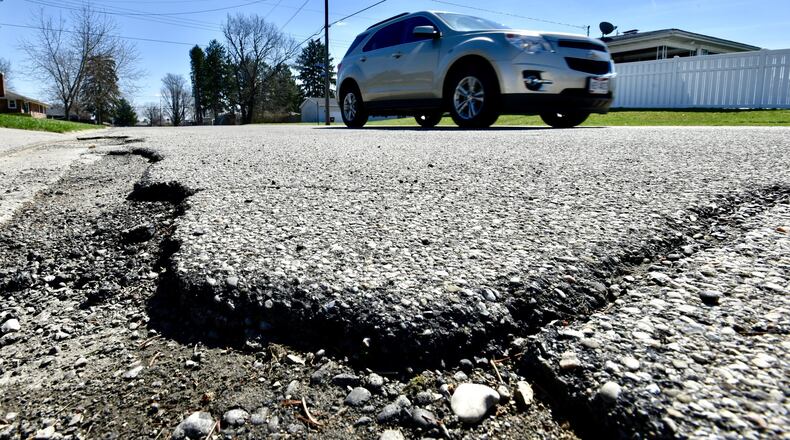“It’s going to be helpful,” Wilkens said. “Most of that money, in our view, will go to resurfacing.”
RELATED: Butler County engineer needs $5 license plate hike for resurfacing
Wilkens told the county commissioners earlier this week that resurfacing is the “lifeline” to the county’s economic development, and he might ask them soon to consider raising license plate fees by $5.
“We’re getting to a critical point to continue to maintain this system, that’s what I’m going to drive at,” Wilkens said to the commissioners. “When you maintain this system, this is one of our big economic development tools, as you well know. If these roads go, economic development goes with it a little bit; there’s no doubt about it.”
Wilkens said the governor’s 18-cent per gallon plan was considered the bare minimum needed to fix Ohio’s roads and bridges, but he was pleased the state Senate came off its 6-cent stance.
In Trenton, homeowners could get a bit of a break on a proposed tax levy request for roads in November. Trenton officials were up against a deadline to pass a resolution of intent to ask voters for a road levy, so council plugged in up to 6-mills. The city needs $5 million over five years to resurface streets.
Finance Director Mike Engle said last week, when the operative tax hike stood at 11 cents, Trenton would receive about $185,000 in additional money so the millage request could drop to 5-mills. Trenton Mayor Calvin Woodrey said it would be up to city council to decide the amount of the levy request Thursday night.
Hamilton’s proposed road levy, slated for the March 2020 ballot, could also be impacted by the gas tax increase.
Jack Whalen, chairman of the citizen-led committee advocating for the levy, previously said the city would lower the levy request amount based on how much extra the city would receive from the gas-tax increase. The initial amount was a 4.9-mill levy that would generate $3.7 million a year, and cost the owner of a $100,000 home about $175 per year.
“The fact it isn’t adjusted for inflation is an important factor. I’m waiting to see those numbers, and then we’ll look at it from there,” he said Wednesday.
One provision that may or may not stay in the transportation bill is new regulations for red light cameras that could pinch funding for jurisdictions that have them. Gov. Mike DeWine during a press conference Tuesday said “I’ll have to take a look at it” when asked about that portion of the bill. The governor has line-item veto power.
The transportation budget bill would among other things mandate that jurisdictions report to the state how much they collected in traffic camera ticket revenue. The state would then deduct that amount from state funding that goes to the cities.
MORE: Ohio’s proposed gas tax increase could affect Hamilton levy plans
New Miami Mayor Bob Henley said he is unconcerned about the potential loss of local government funds.
“I don’t really understand it because they’ve cut the small governments so much in the last few years anyway,” Henley said. “They send us hardly any money at all anymore. So big deal.”
Since the village re-booted its speed camera program in February 2016, it had collected $783,969 through June of last year from the speed cameras. For the total year 2018, it collected $270,099 in net revenue from cameras and $52,448 in local government funds.
The tiny, cash-strapped village is still clenched in litigation with about 3,300 speeders over the original pole-mounted speed cameras that were deemed unconstitutional in 2014. A judge has decided the village must repay the speeders an estimated $3.2 million.
Henley said if the law takes effect in July, he knows the issue will go to court again — with the big cities filing the lawsuits — so the village will let the “big people fight it out.”
Dayton Mayor Nan Whaley has vowed to take the legislature to court again over this.
“We already won this battle in the Supreme Court. Let us not have the same fight again,” Whaley said recently. “We will sue again. We will win again.”
Another provision in the bill only affects Butler County. Sen. Bill Coley, R-Liberty Twp., put in a provision that would allow county Sheriff Richard Jones to take over Emergency Management Agency duties — only with county commissioner approval. Coley said the transportation bill was the right vehicle for this legislation.
“A lot of the stuff we do in transportation is for public safety,” he told the Journal-News. “Our public safety funding for highway patrol and things like that. Those were all things being addressed in the bill and its a coordination of those resources, so it fits in pretty neatly.”
Jones has been trying to take over EMA for a decade because he says he can save taxpayer money. The measure has drawn opposition, including the Butler County Fire Chief’s Association and others, like Ohio Rep. Candice Keller, R-Middletown.
Coley said this measure would be a pilot program and since three of the four Butler County legislators voted in favor of it, he hopes the governor will keep it in the bill.
“We’re trying to give our local governments options to maintain or improve services at a lower cost,” he said.
About the Author
